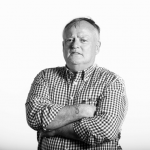BILAWARA LEE: PROTECTING LARRAKIA CULTURE


The old Larrakia lady lay in her bed at the palliative care unit in Royal Darwin Hospital and wept quietly.
Not because she was dying – she accepted that with dignity – but because she feared she would not be able to understand her ancestors when she crossed to the other side.
They would speak only Larrakia, a language not spoken fluently by anyone for at least two generations, and the woman spoke only English. Aunty Bilawara Lee, a respected senior Larrakia Elder, healer and teacher, assured the woman that love conquers all and she would find that she could understand her ancestors and they would understand her.
“She stopped crying, smiled and passed away peacefully.”
Aunty Bilawara is thankful that she is blessed with good communication skills and an uncanny ability to empathise with people, an ability to offer comfort and motivation when it’s most needed.
She gains great comfort by praying to her ancestors every day.
The silent prayers are an integral part of her determination to stay connected to her Larrakia culture and lore.
Larrakia people, the Traditional Owners of Darwin and Palmerston, have been marginalised since Europeans began moving into the Top End of the Northern Territory 150 years ago.
But Larrakia culture is enjoying something of a renaissance.
Aunty Bilawara is driving a concerted effort to resurrect the Larrakia language – about 3000 words have been collated and, in cooperation with Larrakia Nation Aboriginal Corporation, there are plans to publish a dictionary.
“My dream is for the language to live again, for our children and grandchildren to be fluent in their language.
“The Larrakia language is the core connection to our land, our traditions, our culture, our ancestors – it is critical for our identity.”
She believes that teaching Aboriginal children their mother tongue will instill a sense of pride in their rich, ancient heritage.
As a member of Activate Darwin committee, she is driving a Larrakia masterplan, which would eventually have all sacred sites mapped and see many more roads given Larrakia names. Her dream is that every person who arrives in Darwin by land, sea and air will know they have arrived on Larrakia country.
Aunty Bilawara is the academicin- residence at Charles Darwin University – and loves her job.
“I see myself as an ambassador, a link between the university and the community,” she says.
“It’s an excellent, progressive university.
“I like the way it helps people better their lives. A good education nearly always means better health, better job, better living conditions all round.”
Aunty Bilawara has always relished learning and enjoys watching students transformed by being at Charles Darwin, which has a reputation as one of the world’s best small universities.
“I believe that anyone who comes to study at the university, along with the staff, will weave a spiritual danala (dilly bag), in which they can put their hopes, dreams, and the knowledge and skills gained.
“And when they graduate, they can carry their spiritual danala on their life journey knowing that their wisdoms will be safe.
“The university gives people a lift up, it gives them the tools to make a difference for themselves, their families and their communities.”
The grandmother-of-nine is responsible for providing culturally informed guidance, direction and support to Indigenous and non-Indigenous students, staff and stakeholders.
Her position is part of a range of commitments the university has made to formally acknowledge the Larrakia people as the Traditional Owners of the land on which the Casuarina campus stands.
Aunty Bilawara, whose expertise includes Welcome to Country speeches, healing workshops and lectures, cultural presentations and smoking ceremonies, has written two books, Star Dreaming and Healing from the Dilly Bag, and is writing a novel based on her upbringing in Darwin.
Her name in Larrakia is the Redtailed Black Cockatoo, which is her totem – what she calls her “heart Dreaming”.
“Seeing a bilawara always makes me happy.”
Aunty Bilawara may be 72 but is still sprightly and says: “I take no bullshit. I will always stand up for the underdog. And I have nil tolerance for racism, bigotry and violence.”
A “largely built” non-Indigenous Darwin boy found this out the hard way recently when she confronted him after he pulled the hijab off a young Muslim teenager’s head as she got off her school bus.
“I yelled at him and told him, ‘How dare you! This is Larrakia country and I won’t have behavior like that here. If you don’t like it, go back to where you come from’.
“I’ve also confronted Aboriginal people who were fighting, reminding them that they are on Larrakia country and they have no respect by behaving like that.”
Aunty Bilawara was born in the old Darwin Hospital in 1950, a member of the extended Cubillo family, and brought up in a corrugated iron Sidney Williams hut at Parap Camp, now known as Stuart Park.
She was the oldest of 11 children. And when her uncle died, her four cousins were taken in to make a family of 15 children.
“There were no orphans in traditional Aboriginal society.”
Her mother was a Filipino-Aboriginal victim of the Stolen Generations and her father a Chinese-Japanese- Aboriginal soldier, who became a warrant officer in the Australian Army.
The family of 17 had no electricity but considered themselves lucky to have a rainwater tank and a log fire.
“It was a brilliant, happy childhood. Everyone looked out for the kids. If you were hungry, you just knocked on someone’s door and were given something to eat. We were raised by a community.”
Like every other child from Parap Camp, Aunty Bilawara started her education at St Mary’s Catholic Primary School where the nuns were “extremely strict”.
“Aboriginal people’s cultures were considered devil worship and we needed to be purified. They had to save our souls.”
She had always wanted to learn to play the piano and sing but was traumatised when one of the nuns hit her across the knuckles with a ruler when she misplayed a key during a lesson.
“Of course, I missed more keys after that, and she whacked me again and again. I jumped up and ran home hysterical.
“My father was furious. He stormed into the school and pinned the nun, habit and all, up against a wall. He would have punched her if the mother superior hadn’t saved her.
“The nun was British and, apparently, had been in Singapore when the Japanese invaded and had been treated very badly by them. So she hated anybody who looked Asian. And I looked Asian.
“The school moved her out of Darwin the next day – and my Dad was my hero.
“I had always wanted to learn to play the piano but since she bloodied the tops of my fingers, I haven’t touched one since that day.”
Aunty Bilawara left school at 17.
“I would have liked to have gone to university and become a doctor, but that wasn’t allowed in those days. Aboriginal girls were trained to be domestic servants and secretaries. Nothing more.
“But Dad had taught us that he didn’t want to hear any of wjinging and whining about life – that we had to get of our bums and get a good education and then go out into the world, do something we loved doing and then bring about change.
“For me, that was working in education and health, and being a spirit healer.”
Aunty Bilawara’s first job was nursing at the hospital where she was born. She has held several roles since then, all of them caring for others, including 20 years at Canberra University where she gained a Batchelor of Applied Science in Cultural Heritage Management She married Robert O’Neil soon after leaving school and they had three children, Dean, Ryan and Emma. Sadly, she lost her son Ryan only a few weeks ago.
“My dad emphasised the importance of education to me and I emphasised it to my kids and my grandkids. My children all gained qualifications and my grandchildren are doing the same. I am so proud of them all.”
Aunty Bilawara and Australia have come a long way since happily running around barefoot in Parap Camp.
She says the treatment of Aboriginal people has improved “amazingly” during her lifetime, although much still needs to be done.
“I didn’t become an Australian citizen until I was 17.”
There are reminders of the bad old days everywhere she looks.
For instance, she is sad that a water tank was long ago built over the billabong that was the Bilawara Dreaming site on the Stuart Highway.
“That wouldn’t be allowed to happen nowadays, not to my totem’s Dreaming site, especially if I was around.”


